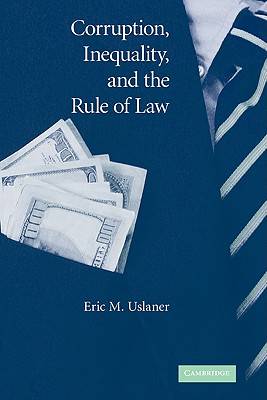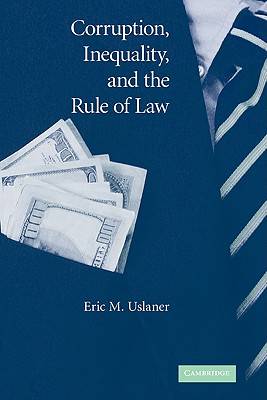
Door een staking bij bpost kan je online bestelling op dit moment iets langer onderweg zijn dan voorzien. Dringend iets nodig? Onze winkels ontvangen jou met open armen!
- Afhalen na 1 uur in een winkel met voorraad
- Gratis thuislevering in België vanaf € 30
- Ruim aanbod met 7 miljoen producten
Door een staking bij bpost kan je online bestelling op dit moment iets langer onderweg zijn dan voorzien. Dringend iets nodig? Onze winkels ontvangen jou met open armen!
- Afhalen na 1 uur in een winkel met voorraad
- Gratis thuislevering in België vanaf € 30
- Ruim aanbod met 7 miljoen producten
Zoeken
Corruption, Inequality, and the Rule of Law
The Bulging Pocket Makes the Easy Life
Eric M Uslaner
Hardcover | Engels
€ 210,45
+ 420 punten
Uitvoering
Omschrijving
Corruption flouts rules of fairness and gives some people advantages that others don't have. Corruption is persistent; there is little evidence that countries can escape the curse of corruption easily-or at all. Instead of focusing on institutional reform, Uslaner suggests that the roots of corruption lie in economic and legal inequality and low levels of generalized trust (which are not readily changed) and poor policy choices (which may be more likely to change). Economic inequality provides a fertile breeding ground for corruption-and, in turn, it leads to further inequalities. Just as corruption is persistent, inequality and trust do not change much over time in my cross-national aggregate analyses. Uslaner argues that high inequality leads to low trust and high corruption, and then to more inequality--an inequality trap and identifies direct linkages between inequality and trust in surveys of the mass public and elites in transition countries. Eric M. Uslaner is Professor of Government and Politics at the University of Maryland-College Park, where he has taught since 1975. He has written seven books including The Moral Foundations of Trust (Cambridge University Press, 2002), and The Decline of Comity in Congress (University of Michigan Press, 1993). In 1981-82 he was Fulbright Professor of American Studies and Political Science at the Hebrew University, Jerusalem, Israel and in 2005, he was a Fulbright Senior Specialist Lecturer at Novosibirsk State Technical University, Novosibirsk, Siberia, Russia. In 2006 he was appointed the first Senior Research Fellow at the Center for American Law and Political Science at the Southwest University of Political Science and Law, Chongqing, China.
Specificaties
Betrokkenen
- Auteur(s):
- Uitgeverij:
Inhoud
- Aantal bladzijden:
- 360
- Taal:
- Engels
Eigenschappen
- Productcode (EAN):
- 9780521874892
- Verschijningsdatum:
- 2/06/2008
- Uitvoering:
- Hardcover
- Formaat:
- Ongenaaid / garenloos gebonden
- Afmetingen:
- 155 mm x 236 mm
- Gewicht:
- 657 g

Alleen bij Standaard Boekhandel
+ 420 punten op je klantenkaart van Standaard Boekhandel
Beoordelingen
We publiceren alleen reviews die voldoen aan de voorwaarden voor reviews. Bekijk onze voorwaarden voor reviews.











